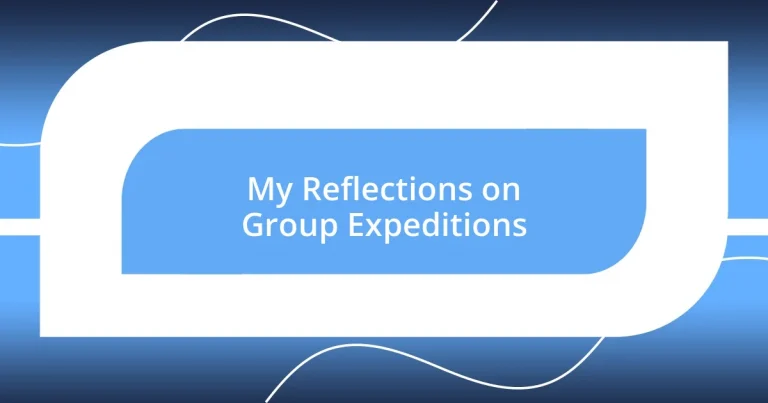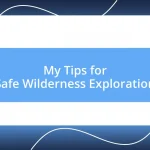Key takeaways:
- Group expeditions foster strong bonds through shared experiences, emphasizing the importance of collaboration, empathy, and effective communication.
- Challenges in group dynamics, such as conflict and varying energy levels, require open communication and adaptability to navigate successfully.
- Personal growth is enhanced by stepping out of comfort zones and leveraging group support, which can transform struggles into opportunities for development.

Understanding Group Expeditions
Group expeditions are unique experiences that often bring together individuals with varying backgrounds and perspectives. I remember my first group trek; I was surrounded by strangers yet felt an immediate bond as we faced the challenges of the trail together. Isn’t it fascinating how shared struggles can transform people into a tight-knit community?
These expeditions require collaboration and communication, often demanding that we step out of our comfort zones. I often reflect on how important it is to listen to others. During a particularly challenging climb, I learned just as much from a quiet member of the group as I did from the more vocal ones. It makes me wonder: how often do we overlook valuable insights simply because they don’t come from the loudest voices?
Moreover, group dynamics play a critical role in shaping the expedition’s overall experience. I’ve witnessed how different personalities can create either a supportive atmosphere or heightened tension. For example, on a kayaking trip, we had a mix of thrill-seekers and cautious paddlers. The way we managed our differences not only influenced our journey but also taught me invaluable lessons about empathy and teamwork. What do you think that says about the importance of understanding group dynamics?

Benefits of Group Travel
Group travel offers a wealth of benefits that can enhance our experiences in ways we might not expect. I’ve learned that the camaraderie formed when exploring new places together is something truly special. For instance, during a recent hiking trip, sharing stories around the campfire brought an unexpected intimacy to our group, creating friendships that lasted well beyond the journey itself.
Here are some key benefits of traveling in a group:
- Shared experiences create lasting memories and deeper connections.
- Cost sharing can make travel more affordable, especially for accommodations and transportation.
- Safety in numbers can provide peace of mind, particularly in unfamiliar environments.
- Diverse perspectives lead to enriched conversations and broaden our understanding of different cultures.
- Motivation and support during challenging activities, like hiking or navigating new cities, boosts morale and pushes us to go further than we might on our own.
Overall, the bonds formed and the unique experiences shared make group travel both rewarding and fulfilling.

Challenges Faced in Group Dynamics
Group dynamics can be tricky, especially when diverse personalities converge. I remember a gear check before a climbing expedition that turned into a heated debate about equipment. Emotions ran high, and I could feel the tension rising. In moments like these, it’s pivotal to remember that open communication is key. How often do we let minor disagreements spiral into bigger issues just because we fear conflict?
Another challenge I frequently encounter is balancing the different energy levels within a group. On a recent snowshoeing trip, our group had both early risers and those who preferred leisurely mornings. This led to a divide in pace that needed careful management. I found that acknowledging these differences and creating flexible plans helped us harmonize better. It made me realize that sometimes, a little adaptability can turn a potential frustration into a memorable learning experience.
Lastly, I’ve noticed that decision-making can either unite or divide a group. During a recent canoeing expedition, we faced a critical choice about our route amidst unexpected weather changes. Some wanted to continue, while others preferred to find shelter. With everyone chiming in, I found myself wishing for a facilitator to guide us. In those moments, having clear leadership can result in a smoother experience, transforming conflicts into collaborative decisions rather than standoffs.
| Challenge | Personal Insight |
|---|---|
| Conflict | It’s essential to prioritize open communication to handle disagreements effectively. |
| Energy Levels | Flexibility in plans can lead to a more harmonious experience. |
| Decision-Making | Clear leadership helps in navigating conflicts and fosters collaboration. |

Effective Communication Techniques
Effective communication in group expeditions can make all the difference, as I’ve discovered during various trips. I recall a moment during a kayaking adventure when one member struggled to keep up. Instead of pointing fingers, we chose to collectively discuss pacing, and this open dialogue not only boosted their confidence but also fostered a sense of teamwork. Have you ever noticed how a simple conversation can shift group dynamics and create a supportive atmosphere?
Listening is just as vital as speaking. I remember sitting around a fire after a long day of hiking when one of our quieter members began sharing their thoughts on the day’s challenges. By giving them the space to express themselves, it opened the floodgates for everyone to share their experiences. I felt a surge of connection as we all revealed our fears and victories. Isn’t it fascinating how genuine listening can transform individual experiences into a collective journey?
Lastly, clarity in communication can significantly reduce misunderstandings. On a trek through rugged terrain, we had to frequently check in with one another about our routes and breaks. I initiated brief group huddles to ensure everyone felt included and their opinions heard. This not only provided clarity but also built trust among us. Isn’t it true that when people feel informed, they are more likely to contribute positively to the group’s morale and decision-making?

Building Trust Within the Group
Building trust is essential for any group expedition, and I’ve learned that sharing experiences strengthens these bonds. On a recent hiking trip, we set aside time to share stories from our lives before hitting the trail. It was amazing how those personal insights broke the ice and created an atmosphere of camaraderie. Have you ever felt more connected after learning someone’s backstory? Trust blossomed that day, allowing us to lean on each other during challenging moments on the hike.
Another key to trust is vulnerability. I recall a moment during a rock climbing excursion when a fellow climber hesitated to take on a tricky route. Instead of brushing it off, I admitted my own fears about previous climbs. This honesty opened the door for others to share similar sentiments, allowing us to embrace our insecurities together. Isn’t it powerful how vulnerability can act as a glue, holding a group together during tough times?
Lastly, accountability plays a crucial role in developing trust within a group. On a backpacking trip, we assigned tasks related to cooking and setting up camp. When one person forgot their responsibility, we didn’t react with blame. Instead, we discussed how we could support one another better. This approach fostered a culture of mutual respect, reminding me that trust grows strongest not just in shared successes but in how we handle setbacks. How do you approach accountability in your own group settings?

Planning Successful Group Activities
Planning successful group activities begins with establishing clear goals. When I organized a weekend camping trip, we sat down together to outline what we wanted to achieve. Did we want adventure, relaxation, or team bonding? This discussion sparked enthusiasm and ensured everyone was on the same page. It’s striking how a shared vision can unite a group even before the expedition begins.
Moreover, choosing the right activities can greatly enhance the group’s dynamics. I once planned a team-building exercise that involved some friendly competition—a scavenger hunt in the woods. The laughter and excitement that ensued were contagious, but what surprised me was how it encouraged collaboration as we combined our strengths to solve challenges. Have you ever seen how a playful environment can dissolve barriers among group members?
Finally, I learned the importance of flexibility in planning. During one trip, unexpected rain forced us to alter our itinerary. Instead of dwelling on the disappointment, we embraced the change and found joy in unexpected indoor activities like card games and storytelling. It reminds me that a successful group activity often lies not in rigid plans but in the ability to adapt and enjoy each other’s company, no matter the circumstances. Don’t you think it’s the moments of spontaneity that often create the best memories?

Personal Growth Through Group Experiences
Group experiences frequently shape personal growth, as they present opportunities for introspection and development. I remember during a kayaking trip, I found myself struggling with self-doubt when my paddling technique wasn’t as strong as my companions. Confronting that feeling head-on, I acknowledged my limitations and sought feedback. This small act of asking for help didn’t just improve my skills; it built my confidence in leaning on others while also showing them that vulnerability can lead to growth.
I’ve also discovered that stepping out of my comfort zone within a group can yield transformative insights. On a recent group trek, I challenged myself to take the lead while navigating unfamiliar terrain. Initially, the pressure felt overwhelming, but as I engaged others with my decision-making, I realized how collaboration can ease individual burdens. Have you ever noticed how sharing the responsibility can lighten the load and make the journey more enjoyable? It was a revelation that I could trust my instincts while also valuing the contributions of my peers.
Moreover, I learned that growth often flourishes through shared challenges and collective problem-solving. I recall a snowy expedition where we faced a sudden blizzard. Instead of panicking, we huddled together, brainstorming solutions and supporting one another. This experience crystallized for me the essence of teamwork: it’s often in the face of adversity that we discover our true strengths. Isn’t it remarkable how life’s obstacles can lead to deeper connections and personal evolution?














